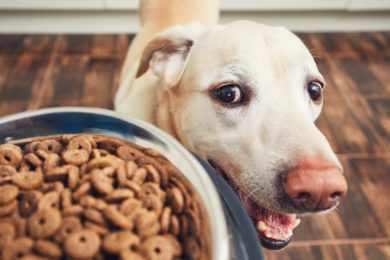Being a pet owner can be pricey, here are some tips to help you get more bark for your buck!
Health:
Vet bills can be expensive. One way to avoid a surprise expense at the vet is by taking good care of your pet’s health with preventative measures.
Clean Teeth, Ears and Eyes:
Keeping your pet’s ears and eyes clean is important to prevent infection. And more than just preventing stinky breath, brushing your pet’s teeth is important to prevent decay and dental disease. You can make sure your pet’s mouth is in tip-top shape by:
- Brushing their teeth regularly, or regularly applying dental gel.
- Making sure your pet is getting enough liquids. While it might seem to make sense that kibble would help brush off tartar on your pet’s teeth it turns out only eating kibble can cause tartar buildup. You can offset this by making sure your pet is well hydrated or getting enough liquids through their food.
- Giving your pets a dental chew toy to play with. This helps get rid of plaque as well as massage their gums to improve blood flow.
A Healthy Weight:
Keeping your pet at a healthy weight can help eliminate a whole bunch of health concerns including joint and heart problems. Your animal being overweight can cause osteoarthritis, type 2 diabetes, respiratory problems, heart strain, and non-allergic skin conditions. You can keep your pet’s weight under control by:
- Feeding them a balanced diet.
- Rewarding them with healthy treats (not too many!)
- Making sure they get plenty of exercise.
Preventing Other Health Surprises:
- Make sure you get your pets vaccinated and treated for parasites and pests (fleas, heartworm etc.)
- Spay/Neuter your pet to make sure you don’t have a whole litter of puppies or kittens to take to the vet.
- Know what kind of health issues are associated with your breed and keep an eye out for early symptoms.
Food:
Pet food is expensive but your furry friend has to eat – You can have a well-fed pet without breaking the bank.
- Buy food or treats in bulk and go halfsies with a friend.
- Save on treats by making your own:
- Get yourself a loyalty card. Many pet food brands offer discounts to repeat customers. It pays to pick a brand and stick with it.
Smart Spending:
Lots of pet products are unnecessarily expensive. If you shop smart you can save on other pet-related costs.
- Waste bags: Save all your old grocery bags and use them instead of the waste bags you would buy from the pet store.
- If you scoop your kitty’s litter more often you can use less of it.
- Buy in bulk: things like kitty litter, freeze-dried treats and catnip don’t go bad. If you can find a deal you should take advantage of the bulk quantities and discounted price.
- Check your pet’s prescription medication costs. Sometimes the markup on vet products is more expensive than the product would be if you bought it over the counter at your local drugstore. Take a look at the active ingredients in your pet’s medications and compare them to products designed for humans. You can sometimes have your vet send your pet’s prescription to the pharmacy to avoid markups. Always double check with your vet!
- Pet insurance: One of the scariest costs associated with being a pet owner is a huge unexpected medical bill. If you can plan ahead you can alleviate some of those concerns.
Training Your Pet:
- Instead of taking your pet to an expensive trainer, see if you can train and socialize your puppy at home with the help of online resources such as YouTube videos and dog walking groups. Find out how to start your own dog walking group: https://www.docupet.com/pet-advice/start-dog-walking-group/
- If your puppy loves to chew, invest in some strong toys and skip the fluffy toys that will get ripped to shreds in no time at all. Getting your pet some strong chew toys can also save your shoes and other items from being chewed instead.
- Make your own training games:
Grooming:
- One way to save a regular pet expense is to groom your dog at home.
- Trim or file your pet’s nails yourself


